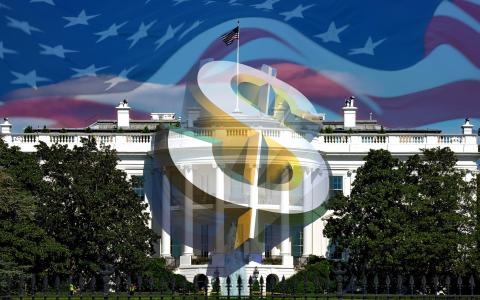
(Yahoo! Finance) - US bank stocks rallied following a decisive win by President-elect Donald Trump, a sign that big Wall Street financial institutions expect to have an easier time in Washington under a new Republican administration.
"This should aid all banks" and especially the biggest ones, Wells Fargo analyst Mike Mayo wrote in a Wednesday note.
Trump's win starts a "new era after 15 years of harsher regulation" that followed the 2008 financial crisis, he added.
Big banks including JPMorgan Chase (JPM), Bank of America (BAC), Goldman Sachs (GS), Wells Fargo (WFC), Citigroup (C), and Morgan Stanley (MS) were all up between 7% and 11% in premarket trading Wednesday morning.
The country’s largest lenders have had a great year thanks to the economy's resilience during a period of elevated interest rates and a rebound in their investment banking and trading operations.
An index tracking 24 of the largest domestically chartered US commercial banks (^BKX) is up 27% so far in 2024, outperforming the broader financial sector and major stock indexes.
The hope is next year could be even better if lending and Wall Street dealmaking churn higher while a new Republican administration loosens some rules for big banks and applies more leniency in approving the sort of corporate mergers that produce big profits for Wall Street giants.
One big lender that may benefit from such leniency is major credit card lender Capital One (COF), which is trying to get regulatory approval to merge with credit card lender and network Discover Financial Services (DFS).
The stock of the McLean, Va.-based Capital One was up 11% Wednesday morning.
Capital One CEO Richard Fairbank told analysts two weeks ago that the tie-up was expected to be completed "early in 2025 subject to regulatory and shareholder" approvals.
Keefe, Bruyette & Woods predicts that on day one a Trump administration could make as many as eight leadership changes at the federal regulatory agencies that supervise banks or other financial services giants.
That includes the Justice Department and the Federal Trade Commission, which oversee antitrust concerns, as well as the Office of the Comptroller of the Currency (OCC), the Consumer Financial Protection Bureau (CFPB), the Securities and Exchange Commission, and potentially even the Federal Deposit Insurance Corporation.
What banks are hoping is that a new administration would also loosen a new set of controversial capital rules proposed by top bank regulators that would require lenders to set aside greater buffers for future losses.
The requirements are based on an international set of capital requirements known as Basel III imposed in the decade following the 2008 financial crisis.
Banks have been fighting this US proposal for the last year in an aggressive public campaign and even dropped hints about suing regulators if they don’t get their way.
They won a big victory in September when some regulators said they would water down those requirements. But not all regulators appear to be on board with that plan, putting the final version in doubt.
Some in the industry expect regulators to scrap the proposal if Trump wins.
"If you're looking at how Trump views the world, I think you see less cooperation with international standard setters," Allen Puwalski, chief investment officer at Cybiont Capital, told Yahoo Finance.
“And I think you see the US back out of Basel III.”
Trump's victory comes at a time when some big bank executives have grown louder about their dislike of Biden-era regulators.
"It's time to fight back," JPMorgan Chase CEO Jamie Dimon said while speaking at an American Bankers Association convention in New York City last week. "I've had it with this shit."
There are some risks, however.
Trump said little on the campaign trail about how he wants regulators to oversee the sector. That means traders are largely betting on the former president's track record.
And it isn't yet clear what the net impact of Trump's wider economic agenda could mean for the industry.
For instance, the fiscal impact of Trump's economic policies are expected to increase the federal deficit by $7.75 trillion through the next decade, according to the Committee for a Responsible Federal Budget.
Mayo said that a combination of a higher deficit and looser regulation under Trump could create a "longer-term issue" leading to a more exaggerated boom-and-bust cycle in markets and the economy.
"Nobody wants a repeat of the" 2008 financial crisis, he added.
By David Hollerith - Senior Reporter



